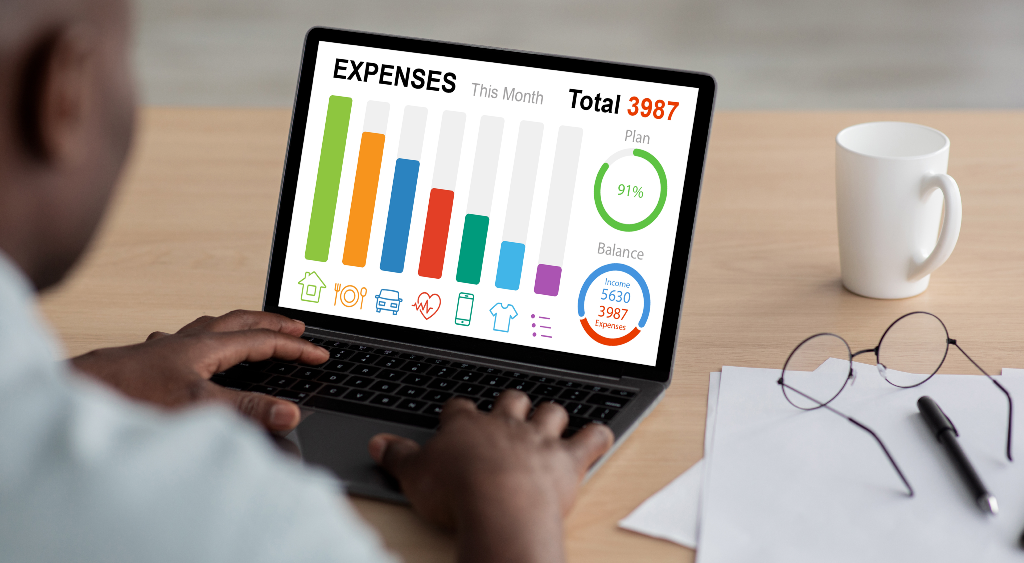6 Ways to Take Control of Your Finances

- Personal finances can be stressful, especially when you are unsure how and where to start to take control of your money.
- You must be financially disciplined and willing to shift your perspective to help take control of your money.
- Once you begin modifying your money habits, the path to becoming financially comfortable begins.
Good financial habits are key to bettering your personal finance. Controlling your money takes discipline and implementing effective practices. Not everyone will have control of their money, but steps can be taken to get there. Therefore, below is a list of different things you can do to kickstart your journey of controlling your money.
1. Write Down Your Financial Goals
The first way you can begin taking control of your finances is by writing down your goals. Everyone has their own objectives, but they can become more challenging to accomplish if you do not have them written down. After you have outlined your goals, start creating a plan to achieve them. Your goals in addition to a realistic plan, can help you become more disciplined on your personal finance journey.
2. Create an Emergency Fund
Taking control of your money means expecting the unexpected. One common way people prepare for unforeseen events is by creating an emergency fund. Your emergency fund must contain three to six months’ worth of living expenses. This fund’s purpose is to help you overcome any financial difficulties that may arise in the future.

Image Credit: Oakland Images / Shutterstock.com
A financial emergency can hinder your long-term financial goals if you do not have an emergency fund. To create your emergency fund, put a portion of your paycheck like $5 or $50 in a designated savings account that can help you keep track of your emergency fund. As a result of this emergency fund, you find that you are less stressed about money because you have a plan that can help you whether any financial emergency.
3. Track Your Monthly Expenses
Another way to manage your money is by tracking your expenses. One method of tracking your where your money is going is by using a budget. A budget can help you to learn how to spend, save, and invest your money according to your short-term and long term financial goals.

Image Credit: Prostock-studio / Shutterstock.com
A financial plan, such as a budget, can indicate what steps need to be taken to reevaluate your money habits like how much you spend or save. By tracking your monthly expenses you can gain a better understanding of your finances while also creating financial stability for yourself.
Recommended Read: Four Types of Budgets to Level Up Your Finances
4. Pay Down Your Debt
One of the main obstacles when taking control of your money is debt. These outstanding amounts can create a financial burden regardless of the debt type. As a result, to make sure these liabilities do not cause long-term financial complications, begin paying them off slowly. Whether it is credit card debt or car payments, you should take proactive steps to reduce these steps.

Image Credit: Cast Of Thousands / Shutterstock.com
Debts carry varying interest rates, all of which increase the outstanding amount that you owe. Having large amounts of debt can create a vicious cycle that makes it difficult to pay off. If you see that the current monthly payments exceed the amount you can pay back, contact the financial institution or company you owe. If you explain your financial situation to them, they may be willing to modify your repayment plan, so it is easier for you to pay them back.
5. Begin Building Wealth
After tracking your expenses and beginning paying down your debt, your next step toward taking control of your finances is to invest the extra money. The key success factor in long-term financial planning is building wealth. The main way people build wealth is through investing.
Recommended Read: How to Change Your Money Mindset for the Better
Although having money in your savings account is important, a portion of it should be invested. The United States economy’s current inflation rate is 8.7%. This high inflation rate means it has lower purchasing power unless the bank gives you an 8.7% interest on the money in your bank account.
As a result, invest a portion of it periodically to ensure that your hard-earned money does not lose its value over time. Investing allows your money to grow through compounding interest; over time, it will enable you to build wealth.
Despite the high inflation rate, the historical return of the S&P is 11.88%. Therefore, your money will increase over time because the average annual return is higher than the inflation rate. However, the key thing to remember when investing is to use money that is not needed. Investments carry risks, and sometimes, they do not pay off.
If investments do not pay off, it could cause the initial capital to decrease and negatively affect your finances. As a result, ensure that you have paid off all your necessary expenses before investing.
6. Reach Out to a Financial Advisor
Everyone needs help from time to time, especially with their finances. However, there are some things where a professional can help better than an average person. Therefore, if your actions to control your money are not producing the expected results, it may be time to reach out to a financial advisor.

Image Credit: goodluz / Shutterstock.com
Financial advisors are professionals who specialize in helping people take control of their money and improve their financial future. Although you may want to take control of your money by yourself, there is no shame in asking for help from others, especially someone who knows how to get you where you want.
The Money Wrap-Up
Becoming financially independent takes time. It requires establishing positive habits and having the mental fortitude to remain disciplined. Tracking your transactions, investing, and setting money aside are examples of taking control of your money. By implementing these changes into your life, you can now begin to control your money and lead a financially comfortable life.
Disclaimer: The information in this article should not be considered financial advice. Always do your own research before investing/making changes to your financial habits. CapWay is not liable for any losses which may be incurred.
Main Image Credit: Tirachard Kumtanom / Shutterstock.com